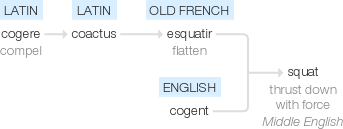Squat
Middle English (in the sense ‘thrust down with force’): from Old French esquatir ‘flatten’, based on Latin coactus, past participle of cogere ‘compel’ (see cogent). The current sense of the adjective dates from the mid 17th century.
wiktionary
From Middle English squatten, from Old French esquatir, escatir(“compress, press down, lay flat, crush”), from es-(“ex-”) + quatir(“press down, flatten”), from Vulgar Latin *coactire(“press together, force”), from Latin coactus, perfect passive participle of cōgō(“force together, compress”).
The sense “nothing” may be the source or a derivation of diddly-squat.
From Latin squatina.
etymonline
squat (v.)
mid-14c., "to crush;" early 15c., "crouch on the heels," from Old French esquatir, escatir "compress, press down, lay flat, crush," from es- "out" (see ex-) + Old French quatir "press down, flatten," from Vulgar Latin *coactire "press together, force," from Latin coactus, past participle of cogere "to compel, curdle, collect" (see cogent). Meaning "to settle on land without any title or right" is from 1800. Related: Squatted; squatting.
squat (adj.)
early 15c., "crouch on the heels, in a squatting position," from squat (v.)). Sense of "short, thick" dates from 1620s.
squat (n.)
c. 1400, "bump, heavy fall," from squat (v.). Meaning "posture of one who squats" is from 1570s; that of "act of squatting" is from 1580s. Slang noun sense of "nothing at all" first attested 1934, probably suggestive of squatting to defecate. Weight-lifting sense is from 1954.
